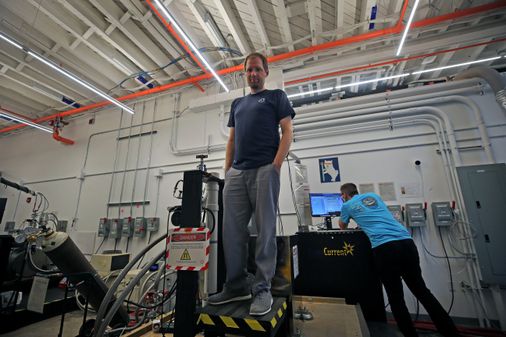Spun out of MIT in 2018, Commonwealth is at the forefront of a bevy of companies racing to build a fusion reactor, which generates power by joining atoms together, creating pollution-free energy without producing long-term nuclear waste. Rival Helion Energy in Washington state raised $500 million last month, and California-based TAE Technologies raised $280 million in April. Government-backed efforts such as the ITER project in France are also ongoing.
“Economical fusion power would deliver massive benefits to the world, enabling us to avoid dangerous climate change while allowing everyone to have a high standard of living,” Boston-area investor Carmichael Roberts, managing partner of Breakthrough Energy Ventures, said in a statement. “CFS is working to achieve fusion at this scale and they have the technology that gives us a path to commercialization in the next decade.”
Breakthrough Energy Ventures, founded by Gates, was an investor in the $1.8 billion deal.
The new fundraising follows Commonwealth’s successful test in September of the world’s most powerful superconducting magnet. Developed in partnership with MIT, the magnet could enable the construction of the first fusion power plants that are practical for commercial use. Commonwealth is building a new campus including its prototype fusion reactor, called SPARC, on a 47-acre site in Devens.
Outside experts agreed that the spike in fundraising is helping speed up advances in the field.
“This is an exciting time for the magnetic fusion community,” Chris Hegna, a fusion expert and professor at the University of Wisconsin-Madison, said. “The growth in private sector investment is certainly accelerating fusion energy development and offers the possibility for commercially viable fusion power within a decade.”
Still, a major fusion breakthrough has been perpetually a few decades away, cautioned Northeastern University physics professor Oleg Batishchev. “There is one constant with nuclear fusion — it was 30 years ahead of us for the past 70 years,” Batishchev said. “But there is hope that mankind will break [through] with renewed efforts.”
There is much more work ahead before Commonwealth will have a viable fusion reactor available. The company said it plans to demonstrate a “commercially relevant” prototype fusion reactor by 2025 and complete its first fusion power plant in the early 2030s.
“The world is ready to make big investments in commercial fusion as a key part of the global energy transition,” Commonwealth chief executive and cofounder Bob Mumgaard said.
The company, which currently employs 175 people, plans to double its workforce this year and complete a manufacturing facility on the Devens campus by late next summer, a spokeswoman said. While the prototype reactor will also be built in Devens, Commonwealth has not yet begun a search for where to build its first full fusion plant.
Aaron Pressman can be reached at aaron.pressman@globe.com. Follow him on Twitter @ampressman.
Credit: Source link



